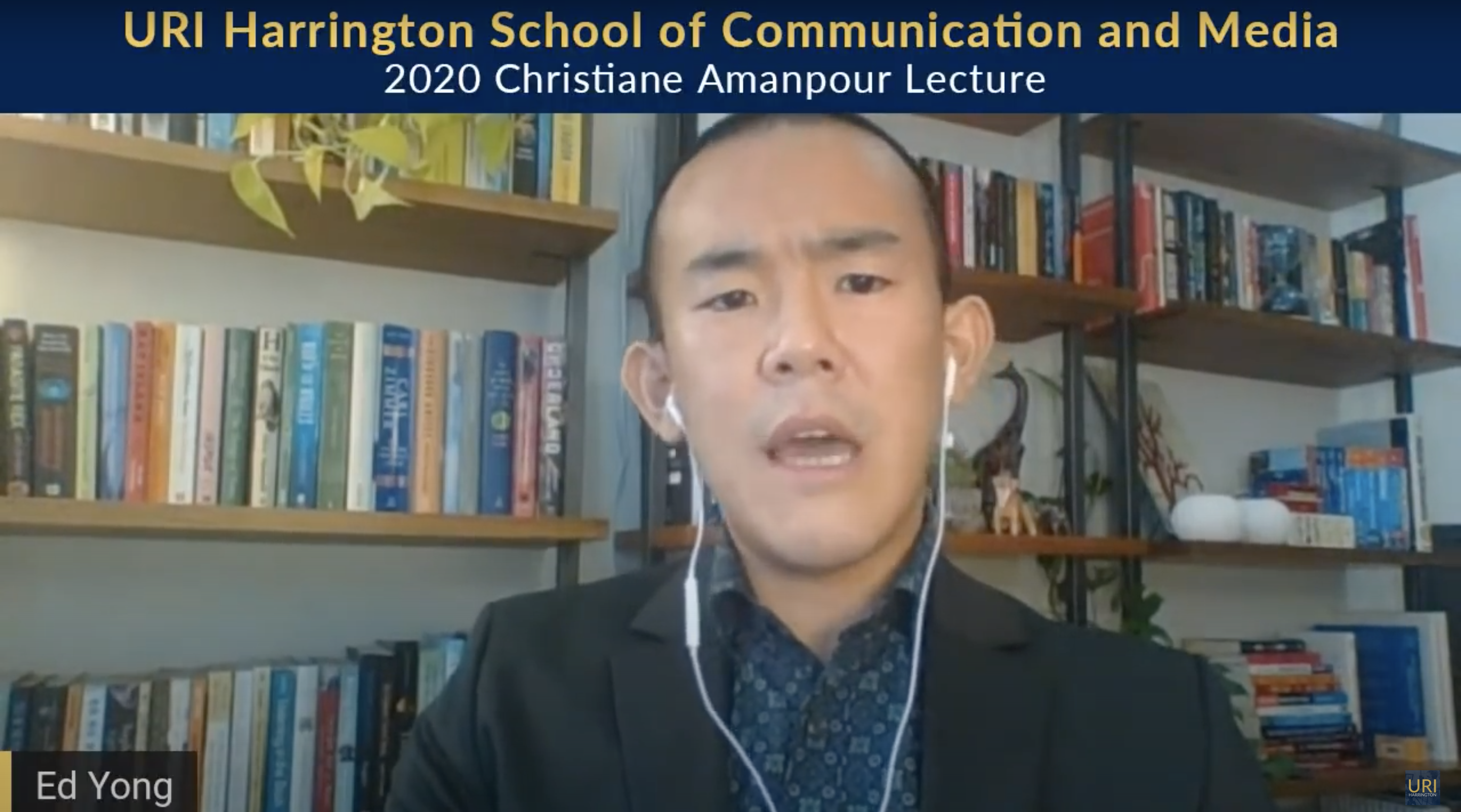Ed Yong, a science journalist from The Atlantic, during his virtual talk about the mistakes America made in handling the COVID-19 pandemic. Screenshots from Grace DeSanti.
During the annual Christiane Amanpour Lecture, journalist Ed Yong argued that pre-existing vulnerabilities in American society exacerbated the toll of the COVID-19 pandemic in the country.
An award-winning science reporter for The Atlantic, Yong spoke via livestream on Oct. 29. at 5 p.m. The lecture was hosted by the University of Rhode Island’s Harrington School of Communication and Media.
Yong said there are multiple reasons why America failed at handling the COVID-19 pandemic. These include pre-existing vulnerabilities such as overpopulated prisons, poorly ventilated buildings and understaffed nursing homes, all which created the perfect conditions for super-spreading events.
“America excels at mistaking privilege for fortitude, and conversely at blaming individuals for societal failures,” Yong said.
Decades of systemic racism and segregation against Black, Latino, Indigenous and Pacific Islander communities led to higher infection and death rates in these populations, according to Yong. A system of employer-linked health insurance also left low-income earners without access to health care.
These systemic failures of the government, according to Yong, are to blame for the pandemic’s wide reaching death toll. About 220,000 Americans have died from the coronavirus to date, which Yong said is probably an understatement due to unreported deaths.
According to Yong, you can’t talk about the pandemic without talking about United States President Donald Trump and his administration’s handling of its emergence. In December 2016, he wrote an article titled “How a Pandemic Will Play Out Under Trump,” published in The Atlantic, about this topic. He said that his predictions came to fruition.
“I suggested that he would rely on ineffective border control, ignore international allies, tweet [ir]rationally, spread misinformation and conspiracy theories, ignore experts such as the [Center for Disease Control and Prevention (CDC)] and exhibit reckless self-confidence,” Yong said.
He called Trump the worst possible leader that America could’ve had during a pandemic of this scale. Yong mentioned Trump’s reality of silencing the CDC, blaming China and lack of a national plan to back up this statement.
As a third wave of COVID-19 affects the nation, Yong said that this surge would be different from previous ones because this is more geographically widespread.
“Unlike in previous surges where health care workers from [less affected areas] could help people in the [more affected areas], reinforcements are going to be more difficult by this time around,” Yong said.
This third wave of COVID-19 will be different from anything endured to date, according to Yong, explaining how families will gather for holiday celebrations despite the pandemic and surging infection rates.
These reunions will be “multi-generational gatherings in indoor spaces for prolonged periods of time in close contact,” resulting in COVID-19 transmissions, according to Yong.
Yong believes that America puts the blame on individuals as opposed to society and used college campuses as an example.
“When outbreaks happened because college students partied, university administrators blamed them for being selfish, but said nothing about their own irresponsible choices in opening up environments in which selfish choices were all but guaranteed,” Yong said.
He discussed topics such as lags in COVID data, lengthening our attention spans and what he calls the “COVID-mystique.” The COVID-mystique, according to Yong, is the idea that the coronavirus is different from any disease we’ve ever dealt with. Yong argued that this is false; many other diseases share the same effects and symptoms of COVID, and that it just seems more intense because it is so widespread.
Pivoting from the COVID-19 “pandemic spiral,” Yong shifted to share some tips he has learned with student journalists at URI. His advice ranged from how to report on science to diversity in the newsroom.
The lecture featured a Q&A session, led by URI journalism professor Jason Jaacks and featured three members of the URI science community.
Assistant professor of communications studies and marine affairs Emily Diamond asked Yong for his opinion on how the media can regain its footing as a trusted and respected institution by Americans in today’s polarized world.
“It’s a hell of a question, and I don’t believe there are easy answers,” said Yong. “Issues of honesty and fairness matter more than any kind of false balance or false pursuit of perceived objectivity.”
Yong said that this is especially hard in regards to a pandemic. He believes that it’s important not to tell readers what to think, but how to think through problems. Yong said that it would be against the profession to pretend that issues that seem partisan are not relevant to the matters of the pandemic.
Despite the stress, anxiety, and isolation that has come out of the coronavirus pandemic, there have also been lessons learned, according to Yong.
“The pandemic has been both tragedy and teacher,” Yong said. “It’s very etymology offers a clue about what is at stake in the greatest challenges of our time and what is needed to address them.”

